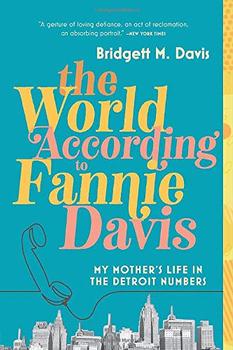Summary | Excerpt | Reviews | Beyond the Book | Readalikes | Genres & Themes | Author Bio

My Mother's Life in the Detroit Numbers
by Bridgett M. Davis
And there was this new fear: If I didn't tell, would I forget what the Numbers were? Grappling with these mixed emotions, for years I topped my New Year's resolution list with the same goal: "Tell Mama's story." But I still couldn't get past the habit of withholding, or the fear of revelation.
Finally, in the way in which we draw from public figures' mythic lives for personal inspiration, I convinced myself that if patriarch Joseph P. Kennedy Sr. could allegedly use his early years as a bootlegger to launch his family's fortune, actions that brought him no recrimination since alcohol became legal anyway, then Mama's work was analogous. She too engaged in a business practice that eventually became legal.
And so I took a big, scary step: I flew to Detroit, sat at the dining room table across from my aunt Florence, my mother's remaining sister, who was celebrating her eightieth birthday that year, and nervously asked the one person whose permission I most needed: Would it be okay with her if I wrote about Fannie's life as a number runner? My aunt's answer surprised me.
"Honey, I'll help you tell it," she said. "'Cause what your mama did was unheard of, what she created was something else and folks should know." And then she smiled. "She made sure you didn't have to worry about no life in Numbers, so I know you don't really understand too much. I'll explain it to you."
I laughed with relief. She was right. I didn't understand the intricacies of the Numbers business. Having Aunt Florence's blessing and her know-how freed me. I started by digging through an old brass trunk filled with my mother's possessions that I'd kept in storage in Manhattan for many years. I hadn't looked through this trunk since Mama's death. Inside, I found a manila envelope filled with nearly a dozen letters that my sister Rita, four years older and the closest sibling to me in age, had written to God. They were composed on pages clearly ripped from the spiral notebooks once ubiquitous in our home, used to record customers' bets, bills, and payouts. In one letter, my then twelve-year-old sister wrote:
Dear God,
Please don't let 543 come out tonight. And please take away Mama's headaches.
Your loving servant, Rita
In another letter, she simply wrote:
Dear God,
Please stop me from worrying.
Thank you, Rita
I'd known that Rita wrote letters to God and stuffed them into the family Bible when we were growing up, but I'd never actually seen one. Reading those letters, all of equal plea, written in a child's hand, blew open the honed narrative about my mother that I'd burnished over the years. With her number running, she'd pulled off an amazing feat worthy of recognition. But the truth was more complicated, and stark: Mama's livelihood was risky business, and my sister articulated the stress we all felt from living with that risk. Rita also understood that given the secret nature of our lives, she could only confide in God.
Back then Rita understood what I did not. To maintain our comfort, Mama fought steadily against the threats of fierce competition and wipeouts, but also against exposure and police busts—and thanks to the cash business she was in, armed robberies and break-ins. Rita knew before I did that Mama carried a pistol in her pocketbook, kept another one in her bedroom. Still a child, and the baby of the family, I knew just enough to keep our secret safe; but my sister, a preteen, knew enough to worry about our safety.
And while it was important to keep our secret, it wasn't at the forefront of my young life. That word secret is so loaded, suggests its country cousin, shame; but I wasn't ashamed of anything because our family secret wasn't dark, and my mother acted neither apologetic nor embarrassed. Secrecy was my normal, part of what it meant to be the child of a particular kind of small business owner: you help out, you keep quiet and you either go into the family business one day, or vow to do something else with your life.
Excerpted from The World According to Fannie Davis by Bridgett M Davis. Copyright © 2019 by Bridgett M Davis. Excerpted by permission of Little Brown & Company. All rights reserved. No part of this excerpt may be reproduced or reprinted without permission in writing from the publisher.
Give me the luxuries of life and I will willingly do without the necessities.
Click Here to find out who said this, as well as discovering other famous literary quotes!
Your guide toexceptional books
BookBrowse seeks out and recommends the best in contemporary fiction and nonfiction—books that not only engage and entertain but also deepen our understanding of ourselves and the world around us.